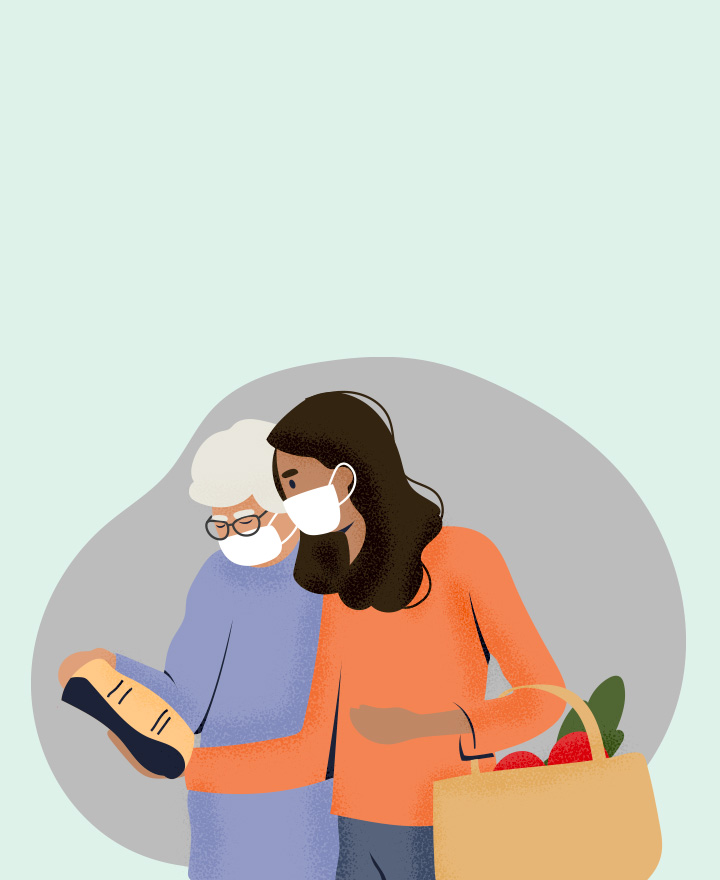

How can seniors improve their vision through diet?
As we grow old, our bodies undergo various changes, and our vision is no exception. Age-related macular degeneration, cataracts, and dry eye are all common eye problems senior citizens may suffer. While a balanced diet isn't a cure-all, senior citizens can improve their vision & potentially reduce the risk of vision problems through a diet rich in specific nutrients. Read on to know more.
Food for Improving Eye Health
Essential vitamins and minerals like vitamins A, C, and E, along with omega-3 fatty acids and antioxidants like lutein and zeaxanthin, all play a role in eye health. Here are some foods that are known to be beneficial for improving eye health:
1. Carrots:
These are rich in beta-carotene which is converted to vitamin A in the body, which is essential for good vision and maintains a moist eye surface to prevent dryness. Other foods rich in vitamin A includes sweet potatoes, cantaloupe, and apricots.
2. Leafy Greens:
Dark green leafy vegetables like kale, spinach, and broccoli contain lutein and zeaxanthin, antioxidants that lower the risk of chronic eye diseases. These antioxidants are found in the macula lutea, a part of the eye responsible for central vision.
3. Citrus Fruits & Berries:
Oranges, lemons, grapefruits, sweet limes, strawberries, and blueberries are excellent sources of Vitamin C. This helps protect eye cells from damage and may reduce the risk of cataracts and macular degeneration.
4. Nuts and Seeds:
Almonds, walnuts, and sunflower seeds are high in Vitamin E, which helps protect the eyes from free radical damage and maintain healthy eye function.
5. Fatty Fish:
Coldwater fish like salmon, tuna, trout, and sardines are rich in omega-3 fatty acids, which contribute to visual development and health of the retina. It may also help protect against age-related macular degeneration.
6. Eggs:
They contain lutein, zeaxanthin, and zinc all of which are beneficial for eye health, particularly egg yolks. Apart from this lean meat and seafood are also good sources of zinc, a mineral essential to promote blood flow to the eyes.
7. Legumes:
Lentils, kidney beans, and chickpeas are good sources of bioflavonoids and zinc, which can help protect the retina and lower the risk of developing macular degeneration and cataracts.
8. Whole Grains:
Brown rice, quinoa, and whole wheat bread provide Vitamin E, zinc, and niacin, which helps overall eye health.
Benefits
While a healthy diet cannot reverse vision loss, incorporating these foods can offer several benefits, including —
• Reduced Risk of Age-related Macular Degeneration which is a primary cause of vision loss in senior citizens.
• Protection Against Cataracts, leading to blurry vision.
• Improved Night Vision
• Reduced Dry Eye Symptoms like irritation, discomfort, and blurry vision.
Tips
Apart from a diet rich in food for eye health, here are additional tips for promoting healthy vision —
• Safeguard your eyes from the sun:
Use sunglasses that block UVA and UVB rays.
• Quit smoking:
Senior citizens should quit smoking, as it heightens the risk of macular degeneration and cataracts.
• Healthy weight:
Obesity is the cause of several eye diseases.
• Control blood pressure:
Hypertension can damage blood vessels in the eye.
• Schedule regular eye exams:
Visit your doctor regularly, as early detection and proper treatment may prevent vision loss.
Conclusion
While maintaining healthy vision as we age requires a multi-faceted approach, incorporating a diet for healthy eyes is a simple and effective step you can take. By consuming a variety of fruits, vegetables, healthy fats, and whole grains, you can provide your body with the essential nutrients it needs to support healthy eyes and vision. Remember, consulting a doctor or registered dietician can help you create a personalised plan to meet your specific needs and preferences.
One of the important components of our overall wellness is also being financially secured. Healthcare emergencies can happen any time, but a good health insurance policy can protect you from such uncertain situations. To know more about Wellness and other health related tips, visit the wellness corner.
Source: aao.org, forbes.com, seniorhelpers.com, emoha.com, homecareassistancedesmoines.com
Disclaimer: This blog provides general information and discussions about health and related subjects. The information and other content provided in this blog, website or in any linked materials are not intended and should not be considered, or used as a substitute for, medical advice, diagnosis or treatment. Kindly contact your Doctor before starting a new medicine or health regime.
Related Articles
5 Most Common Vision Problems And How To Prevent Them
Ageing Eyes: Vision Changes & Common Problems
Health Consequences Of Iodine Deficiency
Published on July 26, 2024














 Health Insurance
Health Insurance  Travel Insurance
Travel Insurance  Car Insurance
Car Insurance  Cyber Insurance
Cyber Insurance  Critical Illness Insurance
Critical Illness Insurance
 Pet Insurance
Pet Insurance
 Bike/Two Wheeler Insurance
Bike/Two Wheeler Insurance  Home Insurance
Home Insurance  Third Party Vehicle Ins.
Third Party Vehicle Ins.  Tractor Insurance
Tractor Insurance  Goods Carrying Vehicle Ins.
Goods Carrying Vehicle Ins.  Passenger Carrying Vehicle Ins.
Passenger Carrying Vehicle Ins.  Compulsory Personal Accident Insurance
Compulsory Personal Accident Insurance  Travel Insurance
Travel Insurance  Rural
Rural